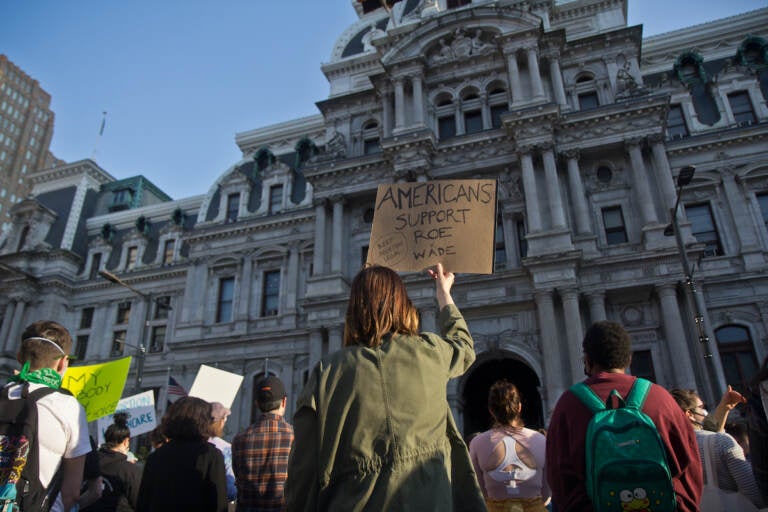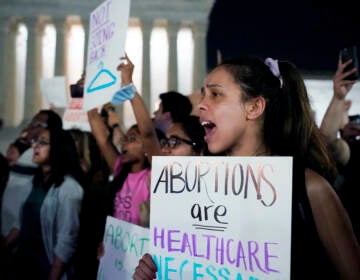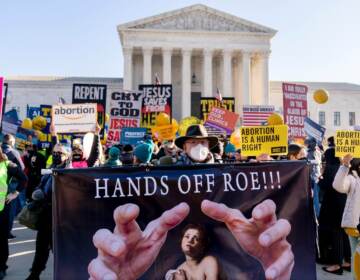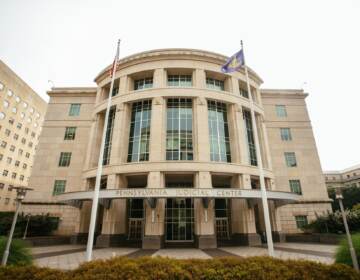Philly abortion-rights advocates expect panic, threats, and increased demand following Roe decision
While Pennsylvania isn’t at immediate risk of abortion rights restrictions, advocates say this week’s SCOTUS decision will lead to more barriers and fear over abortion care.

File photo: Philadelphians rallied for abortion rights outside City Hall on May 3, 2022, after a draft of an opinion by the U.S. Supreme Court overturning Roe v. Wade was leaked. (Kimberly Paynter/WHYY)
While abortion remains legal in Pennsylvania after the overturn of Roe v. Wade, Philadelphia-area leaders say the national decision will change the landscape of abortion services in our area, including possibly deterring residents from seeking care.
Philadelphia officials acknowledged Friday that their ability to guarantee abortion access hinges on whether state-level lawmakers move to restrict the procedure.
In a guide published soon after the U.S. Supreme Court’s ruling, the city health department wrote that the fate of abortion in Philly will likely depend on which candidate wins the governorship in November, and whether the GOP-controlled legislature passes a constitutional amendment aimed at loosening abortion laws.
The amendment, which is making its way through the state Legislature, would ensure that the right to an abortion, or funding for an abortion, is not enshrined in the state constitution. It could go on the ballot as early as May 2023.
“Because of the way it is worded,” health department officials wrote in a statement, “this amendment will impact miscarriage management, in-vitro fertilization, and other reproductive technologies. Constitutional amendments cannot be vetoed by the governor.”
Dr. Alhambra Frarey, an obstetrician and gynecologist at Penn Medicine, joined Pennsylvania abortion providers and adocates for a virtual news conference Friday to decry the national decision and express their concerns about the future.
“[Abortion] is life-affirming and life-saving health care,” Frarey said. “There has always been and there always will be a need for abortions. And this Supreme Court decision is ignoring the real needs of millions of people — their families and their communities.”
Frarey said she expects there will be an influx of out-of-state patients in the wake of the decision, which will make it more difficult for Pennsylvanians to access timely abortion care.
“Some Pennsylvanians will then be driven out of state to access care if they have the resources to travel,” she said. “Others will be forced into unwanted pregnancy and childbirth.”
Elicia Gonzales, executive director of the Abortion Liberation Fund of PA, said her organization already struggles to provide financial support for all of the abortion seekers in the state.
“We are incredibly nervous because we’re not meeting the needs currently,” she said.
ALF-PA, she said, will continue to provide support to Pennsylvania abortion seekers, and the organization will devote extra attention to empowering patients who may be afraid to go to clinics in light of today’s news.
“What we’ve experienced before is that when these types of bans and other kinds of violent restrictions go into effect, it causes chaos and panic,” she said. “And so, first and foremost, we want abortion seekers to know that it is still legal and we are still funding them.”
Gonzales also anticipates more physical and verbal threats to abortion providers and seekers.
“There’s going to be an uptick in clinic violence, which means that there’s going to be a need for more people to provide escort services at the clinics,” she said.
Abortion on the ballet in November
Pennsylvania’s November election for governor is likely the biggest factor in determining whether abortion will continue to be accessible across the commonwealth.
Democratic candidate Josh Shapiro, who currently serves as attorney general, says he’ll veto any attempt to restrict it. Republican candidate Doug Mastriano, currently a state senator and a devout Christian, has abortion views that go beyond much of the GOP — he wants to completely ban the procedure without exceptions for rape, incest, or the life of a parent being at risk.
In recent years, Pennsylvania Gov. Tom Wolf has protected the right to abortion by blocking Republican-led efforts to restrict access.
David Cohen, a constitutional law professor at Drexel University’s Thomas R. Kline’s School of Law, told WHYY News that the GOP-controlled legislature’s proven willingness to restrict the procedure makes Mastriano and Shapiro’s ideological differences on abortion pivotal factors in the November election.
“If Roe remained in place, then the difference between Shapiro and Mastriano would be one of degree, because Mastriano as governor and our legislature could pass restrictions on abortion, but they couldn’t ban it,” Cohen said. “But now that Roe has been overturned, they can ban it.”
Cohen is also representing all Pennsylvania clinics providing abortions in a lawsuit against the state to overturn a ban on using Medicaid funding for abortion care.
Shapiro, in his capacity as attorney general, also acknowledged the likelihood of abortion-seekers traveling to Pennsylvania from states that restrict the procedure.
“I can promise you that if patients travel from those states into Pennsylvania — I will fight to protect them and their doctors from extreme politicians attempting to illegally interfere,” he said in a statement on Friday. “To the doctors and patients in Pennsylvania who are worried about how this decision will impact them, know that the full force of my office is dedicated to protecting legal access to abortion in our Commonwealth.”
Unequal access
Other experts say the Supreme Court decision could be especially harmful for Black and brown abortion seekers, who already face more social and economic barriers to care than white patients.
“We know that bans like these, and what we are going to see in this country, is going to disproportionately harm Black, Latinx, indigenous, and other people of color, because of this country’s legacy of racism and discrimination,” said Signe Espinoza, executive director of Planned Parenthood PA Advocates.
Black mothers in Philadelphia are four times more likely than white mothers to die of pregnancy-related causes, raising concerns that limiting abortion access could exacerbate that trend.
Philadelphia Mayor Jim Kenney issued a statement of support Friday and shared the city’s action guide for protecting abortion services.
“If you are sad, scared, or angry, I want you to know that you are not alone and this fight isn’t over,” Kenney said. “We are determined to do everything in our power to protect this right and support anyone affected by the Supreme Court’s decision.”

Get daily updates from WHYY News!
WHYY is your source for fact-based, in-depth journalism and information. As a nonprofit organization, we rely on financial support from readers like you. Please give today.







